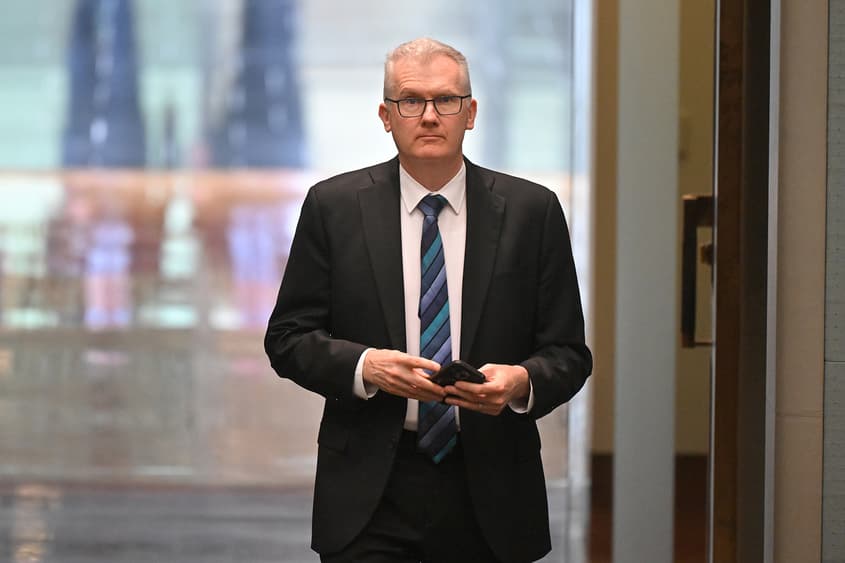Mon 24 Nov 2025 09.00

Photo: AAP Image/Mick Tsikas
In the final days of October, the Federal Government quietly inserted a last-minute amendment into an unrelated bill. It has been trying to rush through a change that would allow police and the Home Affairs Minister to cancel someone’s Centrelink payment if they are suspected of a serious crime. Not after they’ve been charged. Not after they’ve seen a lawyer. Not after they’ve had their day in court. Just an allegation, a warrant, and the stroke of a Minister’s pen.
For most people in Australia, losing your income without warning would be unthinkable. For someone living on a Centrelink payment, it could mean losing your home, your food, your medication, and your ability to keep your children safe.
And yet the Government is trying to give itself the power to cut that income off before a person has been found guilty of anything at all.
It is punishment without conviction. It has no place in a fair society.
This is not a small administrative change or an obscure bureaucratic power. It would allow police to trigger the cancellation of income payments, family assistance, and even parental leave for people who have not been arrested, charged, or convicted.
In fact, the person may not even be aware a warrant exists.
There is no guarantee those payments would ever be reinstated, even if the person is later found not guilty or have no case to answer. There is no guarantee they would receive backpay. There is no independent review. A single minister would hold enormous discretionary power over whether a family has money for rent and food.
This approach fits into a much larger and dangerous trend. The Robodebt Royal Commission laid bare how governments have increasingly treated people on social security payments as suspects, how quickly political rhetoric slips into implying that people who receive social security are doing something wrong. The Commission warned about the way politicians exploit “taxpayer versus welfare recipient” narratives, and how easily that kind of language slides into punitive policy.
This latest proposal shows that lesson is being ignored.
What sits underneath this change is the same damaging assumption that drove Robodebt: that people on Centrelink are not to be trusted.
The mere fact of needing income support becomes grounds for suspicion. Poverty itself becomes a kind of evidence.
That erodes rights that should belong to all of us: the presumption of innocence, the right to due process, and the basic dignity of being treated as a citizen rather than a problem.
Once a government starts implying that millions of people who rely on Centrelink could be treated as potential offenders, those implications do not stay neatly contained.
They seep into policy design, into public debate, and into the culture of our institutions. They shape the way frontline workers treat people, the way the public views them, and the ease with which governments reach for punitive measures instead of fair ones.
These laws deepen that shift. They send the signal that receiving a payment is reason enough to be monitored, controlled, or cut off.
If governments believed these powers were truly justified, they would be introducing them openly, with consultation, scrutiny, and public debate.
Instead, this change was slipped into an unrelated piece of government legislation at the last minute, after all the usual committee processes had been completed. No explanation. No evidence. No justification for bypassing the scrutiny every democratic process depends on.
The people who will be harmed most are those already at the sharpest edges of the system.
First Nations people, who are disproportionately subject to police attention, would be far more likely to lose their payments.
Women fleeing domestic violence, who are frequently misidentified as perpetrators, could have their income cut off at the most dangerous moment in their lives, when they are in hiding.
People with disabilities, who are already more likely to experience misidentification or police involvement, would be at greatly increased risk. And children would lose their means of survival because a parent has been accused of something but not convicted.
We already have processes in place for people who are arrested and remanded in custody. In those cases, payments are suspended, not cancelled, because the person is being held somewhere where their basic needs are met.
That is very different from cutting off the income of someone in the community, who still has to pay rent, buy food, and look after their children. And it is worlds apart from cancelling a payment for a person who may not even know police are looking for them.
Australia does not need new powers that punish people before they are found guilty of any crime.
What we need is the humility, after Robodebt, to stop making the same mistakes — mistakes that start with the assumption that people on payments are problems to be managed rather than people to be treated with fairness.
Cutting off someone’s income on the basis of an allegation is not justice. It is not safety. It is not fairness. It is a shortcut around the principles that are supposed to protect all of us.
The Government should withdraw this proposal. We cannot give up on being a society where everyone is equal before the law. The foundation of our legal system – the presumption of innocence – must apply to all of us, no matter how much or how little you earn.
Kristin O’Connell is a disability support pension recipient and antipoverty activist with the Antipoverty Centre.
Maiy Azize is Deputy Director of Anglicare Australia, a network of charities linked to the Anglican Church.
The 2026 Melbourne Fashion Festival is on this week. This year’s event marks a major milestone as the festival celebrates its 30-year anniversary. It's one of the biggest fashion events in Australia, and it puts Australian design, talent, innovations, skills, trends, and workers in the international spotlight.